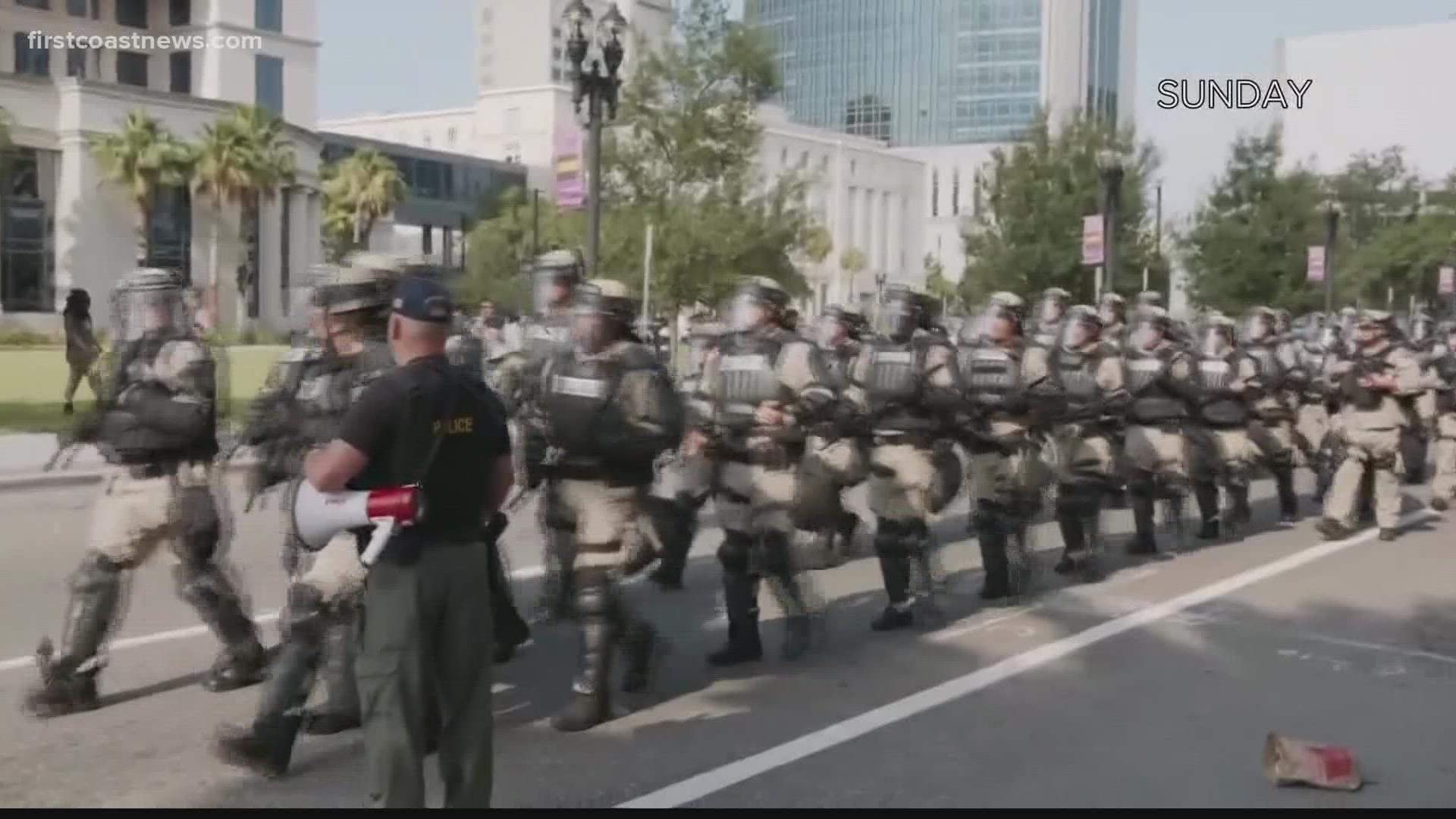JACKSONVILLE, Fla. — A Florida judge has blocked enforcement of Florida Gov. DeSantis’ controversial "anti-riot bill," calling it unconstitutionally vague and potentially "a trap for the innocent."
A federal lawsuit challenging the controversial law signed by Gov. DeSantis was filed back in May, a month after he signed HB1 into law.
The lawsuit, filed by multiple civil rights groups, claims the bill violates the First Amendment right to peacefully assemble, but also the 14th Amendment, citing the law's potential for disparate, discriminatory enforcement.
In his 90-page order, U.S. District Judge Mark Walker in Tallahassee granted the plaintiffs' request for a a preliminary injunction, preventing HB1 from being enforced until the lawsuit is decided by the courts.
Walker begins his order with references to Civil Rights protests in the '50s and '60s, in which officials used vague "anti-riot" laws to suppress constitutionally protected protests.
“What’s past is prologue,” Walker said, quoting Shakespeare.
Walker says the court must determine the definition of the term "riot," which the Florida Legislature created following a summer of nationwide protest stemming from the murder of George Floyd. Those protests prompted the bill, which creates stiffer penalties for violent protests, and allows police to detain protesters until their first court appearance, preventing them from bonding out of jail.
The problem with the statue as written, Walker said, is that the language is so vague as to be unconstitutional.
"HB1’s new definition of 'riot' both fails to put Floridians of ordinary intelligence on notice of what acts it criminalizes and encourages arbitrary and discriminatory enforcement, making this provision vague to the point of unconstitutionality. It requires individuals to 'speculate as to the meaning of penal statutes,' at the risk of their liberty," the order says.
The judge found credible the defendant's claim that their members have engaged in self-censoring due to fears of how the law will be enforced, and he derided the Governor's effort to dispute that claim by submitting a flyer for a Juneteenth celebration scheduled after the bill's passage.
"The Governor has conflated a community celebration of a federal holiday commemorating the end of slavery with a protest," Walker wrote. "It should go without saying that a public gathering of Black people celebrating 'Black joy' and release from bondage does not automatically equate to a protest—or something that the Governor apparently implies should be chilled by the new riot law if Plaintiff Chainless Change’s claimed injury is to be believed."
The judge also dives deep into the grammatical construction of the statue, which he contends is fatally vague. "Defendants’ proposed interpretation strains the rules of construction, grammar, and logic beyond their breaking points, and requires this Court to ignore the plain text of the statute and blithely proclaim that “everyone knows what a riot means,” notwithstanding this new definition that the Florida Legislature enacted," the judge wrote.
The judge said that the law would encompass legitimately illegal activity, but also many legal activities protected by the constitution.
"To be sure, the statute criminalizes a large amount of unprotected activity. But, in its ambiguity, it also consumes vast swaths of core First Amendment speech," the order continues. "Because it is unclear whether a person must share an intent to do violence and because it is unclear what it means to participate, the statute can plausibly be read to criminalize continuing to protest after violence occurs, even if the protestors are not involved in, and do not support, the violence. The statute can also be read to criminalize other expressive activity, like remaining at the scene of a protest turned violent to film the police reaction."
The order specifically references arguments by Ben Frazier, the founder and President of Northside Coalition of Jacksonville, and one of the plaintiffs in the case.
Frazier says that since the enactment of HB 1, “the number of participants at Northside Coalition of Jacksonville’s events has decreased by approximately 30 to 40 percent.”
In the order, the judge cites Fraizer's claim states that many members of the coalition have relayed their fears about what “police or vigilantes will do to justify causing bodily harm to protesters” if they attend rallies, and that it has become “increasingly difficult to bring people out to rallies.
The Northside Coalition of Jacksonville gave this statement to First Coast News upon hearing about the injunction:
“This is a significant victory for the Northside Coalition of Jacksonville and all civil rights groups throughout the United States. This is just one battlefront victory against a racist law. The legal war won't be over until the court finally agrees with us that HB-1 is too vague, too broad and unconstitutional."
The Governor's Office gave First Coast News this statement:
"We vehemently disagree with today’s decision, but this case was always going to be decided by the 11th Circuit Court of Appeals. There is a difference between a peaceful protest and a riot, and Floridians do not want to see the mayhem and violence associated with riots in their communities. We will immediately file an appeal, where we are confident that the 11th Circuit will correctly apply the law and uphold HB 1 to ensure Florida’s law enforcement agencies have the tools necessary to combat riots and keep Floridians safe."
The plaintiffs for the lawsuit are:
- The Dream Defenders
- The Black Collective Inc.
- Chainless Change, Inc.
- Black Lives Matter Allianca Broward
- Florida State Conference of the NAACP Branches and Youth Units
- Northside Coalition of Jacksonville, Inc.
The defendants in the lawsuit are:
- Gov. Ron DeSantis
- Attorney General Ashley Moody
- Leon County Sheriff Walt McNeil
- Jacksonville Sheriff Mike Williams
- Broward County Sheriff Gregory Tony

